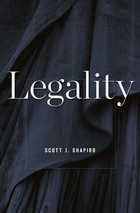
What is law? This question has preoccupied philosophers from Plato to Thomas Hobbes to H. L. A. Hart. Yet many others find it perplexing. How could we possibly know how to answer such an abstract question? And what would be the point of doing so? In Legality, Scott Shapiro argues that the question is not only meaningful but vitally important. In fact, many of the most pressing puzzles that lawyers confront—including who has legal authority over us and how we should interpret constitutions, statutes, and cases—will remain elusive until this grand philosophical question is resolved.
Shapiro draws on recent work in the philosophy of action to develop an original and compelling answer to this age-old question. Breaking with a long tradition in jurisprudence, he argues that the law cannot be understood simply in terms of rules. Legal systems are best understood as highly complex and sophisticated tools for creating and applying plans. Shifting the focus of jurisprudence in this way—from rules to plans—not only resolves many of the most vexing puzzles about the nature of law but has profound implications for legal practice as well.
Written in clear, jargon-free language, and presupposing no legal or philosophical background, Legality is both a groundbreaking new theory of law and an excellent introduction to and defense of classical jurisprudence.

Legality and Legitimacy is sure to provide a compelling reference point in contemporary debates over the challenges facing constitutional democracies today. In addition to Jeffrey Seitzer’s translation of the 1932 text itself, this volume contains his translation of Schmitt’s 1958 commentary on the work, extensive explanatory notes, and an appendix including selected articles of the Weimar constitution. John P. McCormick’s introduction places Legality and Legitimacy in its historical context, clarifies some of the intricacies of the argument, and ultimately contests Schmitt’s claims regarding the inherent weakness of parliamentarism, constitutionalism, and the rule of law.

Contributors. Brenna Bhandar, Silvana Carotenuto, Jonathan Goldberg-Hiller, Jairus Victor Grove, Catherine Kellogg, Catherine Malabou, Renisa Mawani, Fred Moten, Alain Pottage, Michael J. Shapiro, Alberto Toscano
READERS
Browse our collection.
PUBLISHERS
See BiblioVault's publisher services.
STUDENT SERVICES
Files for college accessibility offices.
UChicago Accessibility Resources
home | accessibility | search | about | contact us
BiblioVault ® 2001 - 2024
The University of Chicago Press









